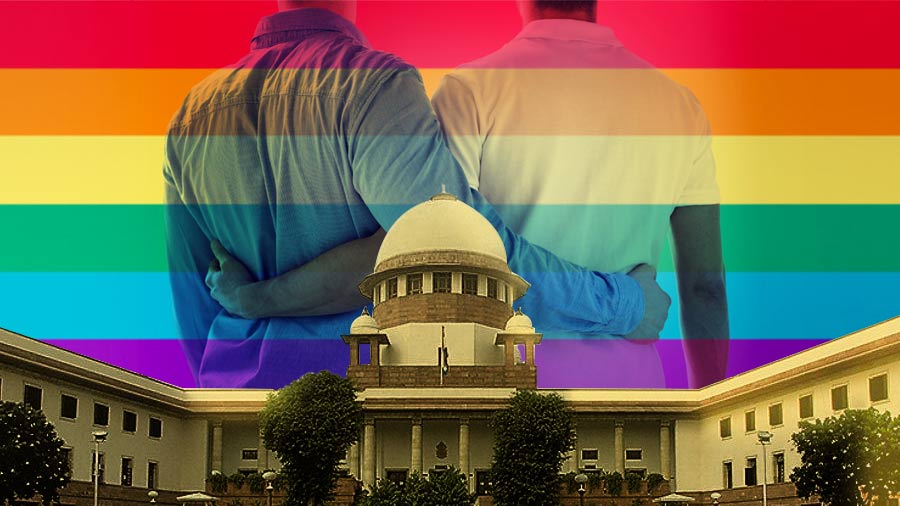The Centre told the Supreme Court on Wednesday it will constitute a committee headed by the cabinet secretary to examine administrative steps that could be taken for addressing "genuine humane concerns" of same-sex couples without going into the issue of legalising their marriage.
The Centre's submission came pursuant to the apex court asking it on April 27 whether social welfare benefits like opening joint bank accounts, nominating life partner in provident funds, gratuity and pension schemes can be granted to same-sex couples without going into the issue of legal sanction to their marriage.
Solicitor General Tushar Mehta, appearing for the central government, told a five-judge constitution bench headed by Chief Justice D Y Chandrachud there were discussions at the previous hearing about some genuine humane concerns of such couples and whether something can be done to address those administratively.
"I have taken instructions and government is positive. What we have decided is, of course subject to your lordships' approval, that this would need coordination between more than one ministries. So, therefore, a committee headed by no less than the cabinet secretary will be constituted," Mehta told the bench, which also comprised justices S K Kaul, S R Bhat, Hima Kohli and P S Narasimha.
The top court was hearing arguments for the seventh day on a batch of petitions seeking legal validation of same-sex marriage.
The solicitor general said the petitioners can give him their suggestions or the problems they are facing, and the committee will go into them and try, so far as possible and legally permissible, to ensure they are addressed.
The bench said the petitioners' side can give their suggestions to the attorney general or the solicitor general without prejudice to their rights in the rejoinder.
The CJI said the counsel appearing for both the sides can have a meeting where these issues can be discussed.
"They are most welcome," Mehta said, adding, "The only difficulty would be, we may not have ready solutions. We mean lawyers." To this, the CJI observed, "We understand because you say that government will constitute a committee headed by the cabinet secretary." Senior advocate A M Singhvi, who is appearing for one of the petitioners, said meeting and giving suggestion is not a problem, but substantial issues are involved in the matter and at best, what is being suggested is "administrative tweaking", where necessary, by a committee based on the suggestions.
"....Without prejudice we can certainly give (suggestions) but, personally, I don't think that your lordships will have any major solution," Singhvi said, adding having seen the entire gamut of problems and the level at which, conceptually and jurisprudentially, the matter has been argued, it would be better that the court goes on to decide the matter.
Justice Bhat observed, "Dr Singhvi, look at it as one or none. Because, although he (Mehta) is saying administrative, there are substantive issues here when you are looking at insurance, housing etc. These are as substantial in terms of the benefits that people can expect. That is actually the practical way out." The bench said the petitioners can give suggestions on what are the barriers which same-sex couple face.
"And if there is a frank discussion out of that, although this is being termed as administrative, this will have to translate into some changes in the regulations, may be even law," it said.
The bench said sometimes beginnings can be small but very substantial.
"We are right now not aware of what we are dealing with. Suppose, as mylords very rightly pointed out, that it might need change of law and change of law might need some wider issues of recognition of a particular relationship, then we will have to examine whether that can be done," Mehta said.
The CJI said from the drift of the submissions, which were made by the solicitor general on the last occasion, it appeared Mehta also accepts that people do have a right to cohabit and the right to cohabit itself is something which is now an accepted social reality.
"Based on that, there may be certain incidents of that cohabitation. For instance, in relation to your right to reside together, bank accounts, insurance policies. These are practical issues which can be resolved by the government. From your perspective also, this is a step forward," Justice Chandrachud said.
Senior advocate Menaka Guruswamy, who is representing some of the petitioners', said something as simple as pension, provident fund, gratuity benefits accrue only in a marriage.
"That accrues in a marriage because of the nature of our rules," the CJI said.
Mehta said suppose the government says the nominee in provident fund would be a family member or anyone else whom the retiring person chooses, then one doen't need to go into anything else and the problem is solved.
"So, sometimes, solutions are simpler than the problem," he said.
Justice Kaul said this is without prejudice to anybody's right and contention. "But they are not, I believe from what Mr solicitor says, reluctant to sort out the problems arising from a gay companionship without labelling it as marriage to the extent possible," Justice Kaul said.
"Therefore, what is the suggestion from the bench is that nitty-gritty of what may in any case is required to be done in either situations some endeavour or step is taken in that direction. Let us, without prejudice to anything else, not sit with pre-notions on either sides as to what can be sorted out," he said.
The CJI said there may be certain areas which are governed by pure administrative changes and those can easily be done by the government.
Justice Chandrachud said changes, which they accept as a matter of principle, which may require changes in some form of subordinate regulations, is again a matter for the government and they don't have to go to Parliament for that.
The CJI said the fundamental point raised by the petitioners is that there is a right to marry and it can be sourced in the Special Marriage Act.
"Therefore, we are saying that well we will, of course, have to decide it. We are going to decide this entire issue as a matter of concept but to the extent which the government takes the first step forward, there would be a substantial benefit or substantial advancement in the recognition of cohabitation relationship of same-sex couples in the country," the bench said during the hearing which is underway.












